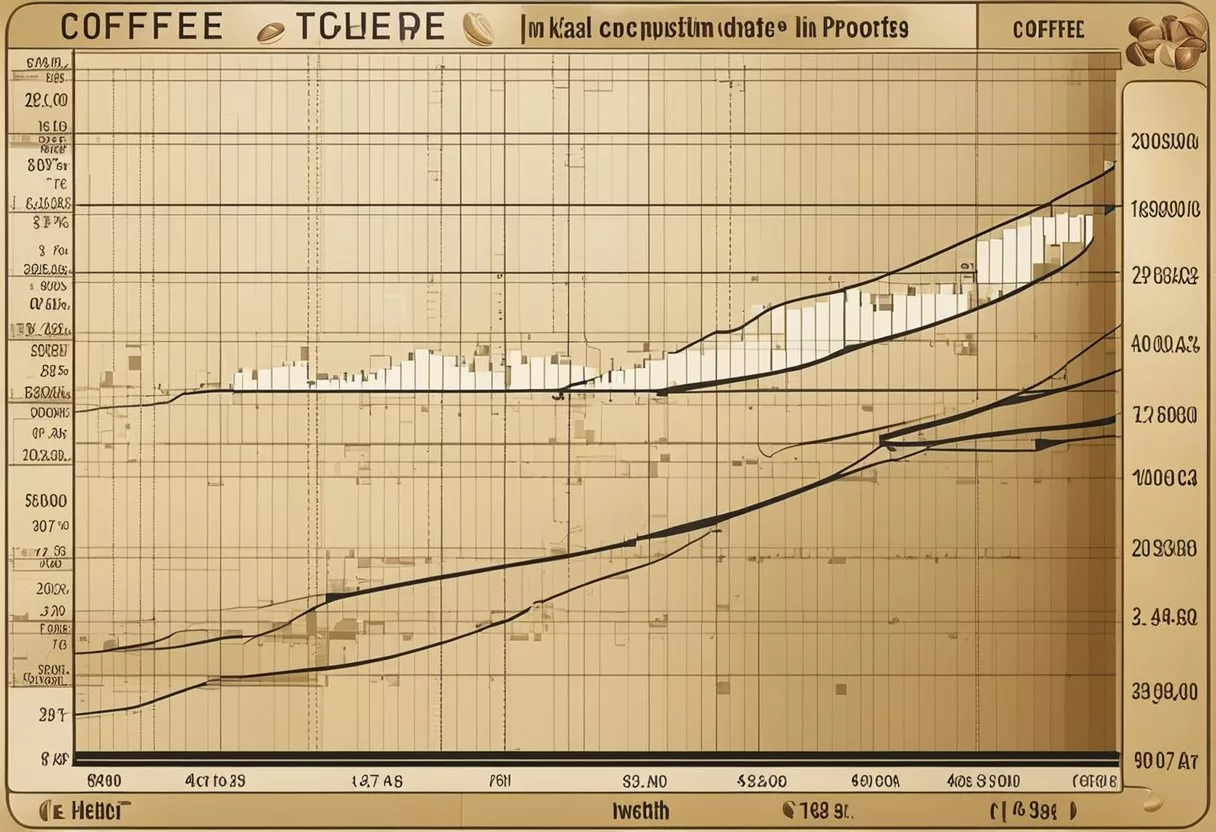Coffee is more than just a morning pick-me-up. Recent studies have pointed to its potential benefits for a man’s health. Drinking coffee may lower the risk of developing prostate cancer, including more aggressive forms of the disease.

Research shows the link between coffee consumption and a reduced risk of lethal prostate cancer. Men who drink the most coffee are found to have a lower chance of developing the disease. This effect appears regardless of whether they choose decaffeinated or regular coffee.
Coffee’s impact on prostate health comes from its potential to improve glucose metabolism, reduce inflammation, and act as an antioxidant. These factors may play a role in lowering cancer risk, making coffee an interesting topic of study for health enthusiasts and researchers alike.
Key Takeaways
- Coffee may reduce the risk of prostate cancer.
- High coffee consumption lowers the chance of lethal prostate cancer.
- Both regular and decaf coffee show potential benefits.
What is Prostate Cancer?

Prostate cancer is a significant health concern for men worldwide. It’s essential to grasp its epidemiology and the stages through which it progresses.
Epidemiology of Prostate Cancer
Prostate cancer is the most common solid-organ tumor in men residing in developed countries. Globally, it is the second most common cancer among men. In the United States alone, an estimated 248,530 new cases were reported in 2021, with approximately 34,130 deaths.
Various risk factors contribute to the initiation and development of this cancer. Age is a primary factor, with older men being at higher risk. A positive family history and genetic polymorphisms also play a crucial role.
Prostate disease often starts as localized prostate cancer and can progress to more advanced stages if not diagnosed and treated early. It highlights the importance of understanding how this cancer develops and spreads.
Stages and Progression of Prostate Cancer
Prostate cancer progresses through several stages. Initially, it is localized within the prostate gland. At this stage, symptoms might be minimal or absent, making early detection challenging.
As the cancer advances, it can spread to nearby tissues and organs. This stage is referred to as locally advanced prostate cancer. Symptoms may include difficulty urinating, blood in the urine, or pelvic pain.
In its most severe form, advanced prostate cancer, the disease may metastasize to distant organs such as the bones or lymph nodes. This stage poses significant health risks and requires more aggressive treatment approaches to manage.
Understanding the stages of prostate cancer aids in timely diagnosis and treatment, thereby improving patient outcomes. Recognizing symptoms early and seeking medical advice can be crucial in managing the progression of this disease.
The Role of Coffee in Health
Coffee is not just a popular beverage; it has significant impacts on health. This section explores the general health benefits and the effects of caffeinated versus decaffeinated coffee.
General Health Benefits of Coffee
Coffee consumption is linked to numerous health benefits. It contains antioxidants such as polyphenols, which help reduce inflammation and fight oxidative stress. These antioxidants can protect cells from damage, potentially lowering the risk of chronic diseases.
Coffee also improves glucose metabolism and decreases concentrations of plasma insulin, which may reduce the risk of type 2 diabetes. Moreover, studies have shown that coffee may lower the risk of certain types of cancer, including liver and colorectal cancer.
The beverage has neuroprotective properties as well. Regular coffee drinkers are less likely to develop neurodegenerative diseases like Alzheimer’s and Parkinson’s. Coffee’s benefits extend to heart health, too, as moderate consumption can reduce the risk of heart disease and stroke.
Differences Between Caffeinated and Decaffeinated Coffee
Caffeinated and decaffeinated coffee both offer health benefits, but there are some differences. Caffeinated coffee contains caffeine, which can boost mental alertness and energy levels. It can also improve physical performance by increasing adrenaline levels.
Decaffeinated coffee provides many of the same health benefits as regular coffee since it retains most of the antioxidants and nutrients. Studies suggest that decaffeinated coffee can still contribute to reduced inflammation and oxidative stress.
However, those sensitive to caffeine or with certain medical conditions may opt for decaffeinated coffee to avoid potential adverse effects like increased heart rate or insomnia. Both forms of coffee can aid in improving overall health, making the choice dependent on individual health needs and preferences.
Coffee Consumption and Prostate Cancer Risk

Research shows that higher coffee consumption is linked to a lower risk of prostate cancer. Various studies, including large cohort studies and systematic reviews, support this association.
Analyzing Cohort Studies and Clinical Trials
Several cohort studies, such as the Health Professionals Follow-Up Study, have examined the link between coffee consumption and prostate cancer incidence. These studies follow large groups of men over time, tracking their coffee intake and health outcomes.
Clinical trials have also provided insights. Some trials focus on biological mechanisms, showing that coffee’s compounds might slow the growth of prostate cancer cells. For instance, recent studies suggest that men who drink boiled coffee have lower odds of receiving a prostate cancer diagnosis compared to those who drink filtered coffee.
However, it’s crucial to consider potential biases. Selection bias in case-control studies could affect the observed associations. Results must be viewed with caution given the complexity of prostate cancer’s etiology, including factors like genetic polymorphisms and family history.
Insights from Meta-Analyses and Systematic Reviews
Meta-analyses and systematic reviews aggregate findings from multiple studies to give a broader perspective on the impact of coffee on prostate cancer risk. A meta-analysis by BMJ Open found that higher coffee consumption was significantly associated with a reduced risk of prostate cancer.
For each additional cup of coffee per day, there was an approximate 1% reduction in prostate cancer risk. The meta-analysis also reported a pooled relative risk (RR) of 0.91 for the highest category of coffee consumption compared to the lowest.
These reviews follow PRISMA and MOOSE guidelines to ensure comprehensiveness and reliability. Such analyses confirm that the relationship between coffee intake and lowered prostate cancer risk is consistent across different populations and study designs.
Diet and Lifestyle Factors

Diet and lifestyle choices play significant roles in prostate health. Factors such as nutrition, smoking, and alcohol consumption can influence the risk of prostate cancer and other prostate-related conditions.
Influence of Diet on Prostate Cancer
Nutrition is crucial in managing prostate cancer risk. Diets rich in vegetables, fruits, and lean proteins can be beneficial. For example, studies suggest that consuming tomatoes and broccoli may help reduce prostate cancer risk due to their high levels of antioxidants. In contrast, high animal fat consumption, such as red meat, may increase risk factors.
In Japan and Sweden, where diets are typically healthier, prostate cancer rates are lower. Green tea, commonly consumed in Japan, has been studied for its potential protective effects against prostate cancer. Limiting intake of fatty foods and focusing more on plant-based diets could contribute to better prostate health.
Impact of Smoking and Alcohol Consumption
Smoking is a well-known risk factor for many cancers, including prostate cancer. Chemicals in tobacco can cause genetic changes in prostate cells, increasing cancer risk. Stopping smoking can significantly decrease these risks and improve overall health.
Alcohol consumption’s impact is complex. Moderate alcohol intake might not significantly influence prostate cancer risk, but heavy drinking can lead to other health issues and complicates prostate cancer treatment. Limiting alcohol to moderate levels is advisable to minimize potential risks.
In summary, a diet low in animal fats and high in fruits and vegetables, coupled with minimal smoking and moderate alcohol consumption, can greatly influence prostate health. These lifestyle adjustments are simple yet effective in managing overall risk.
Biological Mechanisms of Action

Coffee consumption may have several effects that could contribute to a reduced risk of prostate cancer. These effects include changes in sex hormone levels, modulation of insulin and glucose metabolism, and impacts on specific cancer-related pathways.
Effects of Coffee on Sex Hormone Levels
Coffee contains compounds that can influence sex hormone levels. Research suggests that coffee increases testosterone and decreases sex hormone-binding globulin and estrogen. These changes in hormone levels could contribute to reducing the risk of prostate cancer by altering the hormonal environment in which cancer cells thrive. Adjustments in hormone levels may prevent or slow the growth of prostate cancer cells.
For example, a study does show that coffee may increase testosterone while reducing estrogen, which potentially decreases the risk of prostate cancer. Additionally, this balance between increasing and suppressing different hormones might impact the overall hormonal landscape, making it less favorable for cancer development.
Coffee’s Impact on Insulin and Glucose Metabolism
Coffee also plays a role in improving glucose metabolism and decreasing plasma insulin levels. These effects are significant because high levels of insulin and insulin-like growth factor-1 are associated with increased cancer risk.
By enhancing glucose metabolism and reducing insulin levels, coffee may help in maintaining a metabolic environment that is less prone to cancer growth (https://www.ncbi.nlm.nih.gov/pmc/articles/PMC7805365/). Decreased plasma insulin implies lower stimulation of insulin receptors on prostate cells, leading to reduced risk.
Coffee’s ability to reduce inflammation and oxidative stress further supports healthy glucose and insulin levels, contributing to lower risks of cancerous growth.
Coffee Compounds and Cancer Pathways
Certain compounds in coffee, such as caffeine and various antioxidants, can influence cancer-related pathways. Caffeine has been shown to induce autophagy and regulate the NF-κB pathway, which are crucial in carcinogenesis. By modulating these pathways, coffee can reduce the expression of inflammatory mediators and other factors involved in cancer progression, like NF-κB, TNF-α, IL-6, and IL-8 (https://pubmed.ncbi.nlm.nih.gov/35496060/).
In addition, antioxidants and anti-inflammatory components in coffee can protect against DNA damage and support the body’s defense mechanisms against cancer initiation. Modulation of DNA methylation patterns may also play a role in reducing cancer risk. These molecular actions collectively contribute to the chemopreventive effects of coffee against prostate cancer.
Findings from Specific Populations and Cohorts

Recent studies have examined the relationship between coffee consumption and prostate cancer risk in various populations. Specific findings have been reported, notably among Japanese cohorts.
Study of Prostate Cancer in Japanese Men
Research conducted in Japan has provided valuable insights into the effects of coffee on prostate cancer. The Ohsaki Cohort Study looked at a large sample of Japanese men. The study found that higher coffee consumption was linked to a lower risk of localized and advanced prostate cancer.
Japan has seen an increase in coffee popularity, making these findings particularly relevant. Another study involving Japanese men also noted a similar association. An increase in coffee intake of two cups per day was associated with a 7% decreased risk of prostate cancer.
Limitations of Current Research

Current research on coffee and prostate health faces several significant challenges. Understanding these hurdles is essential for interpreting findings and guiding future studies.
Challenges of Self-Reported Data
Many studies on coffee consumption rely on self-reported data, which can be unreliable. Participants may forget how much coffee they drank or misreport their intake. This recall bias can lead to inaccurate data, making it difficult to draw solid conclusions.
Food diaries are often used, but they too have limitations. People might not record their coffee consumption consistently. These inaccuracies highlight the need for more controlled methods, such as direct observation or biochemical measures.
Selection Bias and Confounding Variables
Research often suffers from selection bias because study participants are not always representative of the general population. Volunteers for clinical trials may have specific characteristics that influence the results.
Confounding variables, like lifestyle factors, can also skew findings. For example, coffee drinkers might have different diets or exercise routines compared to non-drinkers. These variables make it challenging to isolate the effect of coffee on prostate health.
Need for Longitudinal and Diverse Studies
Short-term observational studies provide limited insights. Longitudinal cohort designs, which track participants over many years, are crucial for understanding long-term effects. However, these studies are expensive and time-consuming.
Moreover, most research focuses on specific populations, often neglecting diverse groups. Including varied demographics in future studies is vital to ensure findings are applicable to everyone. This approach requires a broader sample but is essential for more comprehensive and generalizable results.
Practical Implications and Recommendations
Studies show mixed results on whether coffee can help prevent prostate cancer. Some research indicates a possible link between coffee consumption and a lower risk of prostate cancer. For instance, higher coffee consumption was associated with a reduced risk of prostate cancer in a systematic review.
Recommendations for Coffee Drinkers:
- Moderation: Drinking coffee in moderation might be beneficial. Regularly consuming six or more cups could lower prostate cancer risk by 18 percent, as noted in an AICR-supported study.
- Boiled vs. Filtered Coffee: Men who drink boiled coffee may have a lower incidence of prostate cancer compared to those who consume filtered coffee, according to a WebMD article.
It is important to note that not all studies agree on the causal relationship between coffee and prostate cancer prevention. For instance, an analysis using summary data from multiple sources found no significant association between coffee intake and prostate cancer risk. The results can be seen in this research.
Other Practical Considerations:
- Primary Prevention: Incorporating coffee as part of a healthy lifestyle might contribute to primary prevention strategies against prostate cancer.
- Consult Healthcare Providers: Always speak with healthcare professionals before making significant changes to diet, especially for those with pre-existing conditions.
While coffee may have potential benefits, it is one of many factors that can affect prostate cancer incidence.
Analyzing Intake Levels and Frequency Measures

Researchers have examined the connection between coffee intake and prostate cancer risk by studying different intake levels and using various frequency measures.
Intake levels are often categorized into groups. The highest intake category typically includes individuals consuming large amounts daily, while the lowest intake category includes those with minimal or no coffee consumption.
In studies, intake is often measured using:
- Food-frequency questionnaires
- Self-administered dietary questionnaires
Of the 16 cohort studies reviewed, 11 used food-frequency questionnaires and five used self-administered dietary questionnaires (source).
Example Breakdown
- Highest intake category: More than 3 cups per day
- Lowest intake category: Less than 1 cup per week or none
In one analysis, the time from exposure to diagnosis was measured at intervals of 0-4, 4-8, 8-12, and 12-16 years (source).
Comparative Measures
Different intake levels can reveal potential patterns in prostate cancer risk. For example:
- Those in the highest intake category might show distinct risk trends compared to the lowest intake category.
Diagnosis and Reporting
Clinical diagnosis of prostate cancer often starts with a visit to a physician. Symptoms like trouble urinating or pelvic pain may prompt screening tests.
A key tool in screening is the Prostate-Specific Antigen (PSA) test, which measures PSA levels in the blood. High PSA levels can indicate prostate cancer.
Digital Rectal Examinations (DRE) are also common. During a DRE, a doctor feels the prostate for abnormalities.
If these tests suggest cancer, a biopsy is usually performed. Tissue samples are examined under a microscope to confirm the presence of cancer cells.
Maintaining accurate medical records is crucial. These records include PSA levels, biopsy results, and imaging studies.
Cancer registries play a vital role in tracking prostate cancer cases. They collect data on incidence, treatment, and survival rates.
Efficient reporting helps in understanding trends and improving patient care. Physicians rely on comprehensive records to make informed decisions.
Clear communication between doctors and patients ensures effective diagnosis and treatment planning.
Frequently Asked Questions

Coffee’s impact on prostate health includes potential benefits related to reduced cancer risk and considerations for those with existing prostate conditions.
What are the effects of coffee on prostate health?
Certain compounds in coffee may slow the growth of prostate cancer cells. Studies suggest men who drink coffee, especially brewed coffee, might have a lower risk of developing prostate cancer.
Can the consumption of coffee affect prostate cancer progression?
Drinking coffee has been linked to a reduced risk of lethal prostate cancer. Men consuming one to three cups daily could see benefits regardless of whether the coffee is caffeinated or decaffeinated.
Are there specific types of coffee better for prostate health?
Both regular and decaffeinated coffee show potential benefits. However, men with conditions like an enlarged prostate might need to monitor their intake, as caffeine can irritate the bladder and worsen symptoms.
How does decaffeinated coffee impact the prostate?
Decaffeinated coffee has been associated with similar prostate cancer risk reduction as regular coffee. The benefits appear to stem from non-caffeine components within the coffee.
What is the relationship between coffee consumption and PSA levels?
Research indicates that regular coffee consumption may not significantly affect PSA levels, a marker often used to screen for prostate cancer. However, individual responses can vary.
What beverage alternatives are recommended for optimal prostate health?
For men concerned about prostate health, water, herbal teas, and green tea are often recommended. These alternatives are less likely to irritate the bladder and may provide additional health benefits.
